China-Venezuela ties riding on fast track
Updated: 2014-07-20 09:38
By Chen Weihua in Washington (China Daily Latin America)
|
||||||||
|
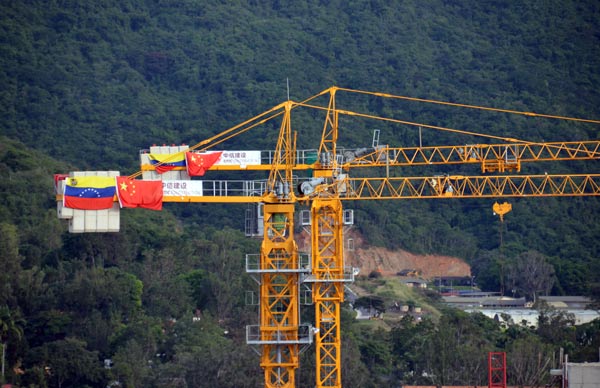 A view of the construction site of a housing project undertaken by China's CITIC Construction Co Ltd at Caracas, Venezuela in this file photo taken in November 2013. XU YE / XINHUA
|
One highlight of the bilateral relationship has been the expanding bilateral economic and trade cooperation, which has benefited both countries in energy, agriculture, infrastructure and high-tech industries. The South American nation has already become China's key trade partner and investment destination in Latin America.
Bilateral trade reached $19.24 billion in 2013, compared with only $589 million in 2001 and $8.81 billion in 2008. China has become Venezuela's second-largest trading partner while Venezuela is China's fourth-largest trading partner in Latin America.
Of last year's trade, China imported $13.18 billion from Venezuela, mostly crude oil, oil products and minerals, while China exported $6.06 billion of goods, mostly electric appliances, computers and other electronic products and machineries.
The two countries have not only seen eye to eye in promoting a multi-polar world, but also found their strategic interests complementing each other. While China tries to diversify the sources of its oil imports, Venezuela is trying to reduce its over-reliance on oil exports to the United States, two countries that view each other as enemies despite the huge oil trade.
During his visit to Venezuela in April, Chinese Foreign Minister Wang Yi said China and Latin American countries are all developing nations and share common pursuits, goals and tasks.
In December 2004, Venezuela recognized China's full-market economy status.
More than 40 Chinese companies covering infrastructure construction, oil exploration, power station construction, auto-making and cell phone manufacturing have set up their foothold in Venezuela. Just on June 25, Maduro attended the inauguration of an automated storage facility built by Chinese telecom equipment giant ZTE.
Also last month, Venezuelan officials and representatives from Chinese bus company, Yutong, agreed to the creation of a joint venture to build and operate a bus factory, with an annual assembly capacity of 2,500 buses.
Meanwhile, bilateral exchanges in culture, education, science and technology have also progressed rapidly. The two countries extended their culture cooperative program to 2014-2016.
China and Venezuela have also been exchanging students. China has agreed to provide up to 100 government scholarships to Venezuelan students each year starting with the 2014-2015 academic year.
In science and technology, China helped launch Venezuela's second satellite on September 29, 2012, delivering the spacecraft into a 644-kilometer-high orbit to monitor Venezuela's territory and survey crops and natural resources.
The remote sensing satellite, known as VRSS 1 or Francisco de Miranda, a Venezuelan revolutionary hero, was built by the China Academy of space Technology and the launch was arranged by the China Great Wall Industry Corp. It was Venezuela's second satellite built by China. In 2008, China launched a communications satellite named Venesat 1, nicknamed Simon Bolivar, the leader of Venezuela's struggle for independence.
In a recent interview with the Chinese news media, Zhao Rongxian, Chinese ambassador to Venezuela, described the bilateral relationship as entering a mature stage. He revealed that talks are under way to launch a Confucius Institute in Venezuela to promote better understanding between the two peoples.
A Venezuelan tourism promotion event in Beijing late last month also drew representatives from Venezuela's Ministry of Tourism and its embassy in Beijing to woo more Chinese tourists to the beautiful South American country.
Yuan Dongzhen, a researcher at the Institute of Latin America Studies under the Chinese Academy of Social Sciences, said the China-Venezuelan relationship has been elevated dramatically in recent years, making Venezuela an important Latin American partner for China.
Yuan told China Daily that the two countries should further enrich their strategic partnership to ensure a healthy and sustainable development of the relationship.
"The two countries should further expand their cooperation. Besides a further strengthening of ties in energy and mining, more emphasis should be placed in infrastructure, agriculture, social development and high-tech sectors," he said.
|
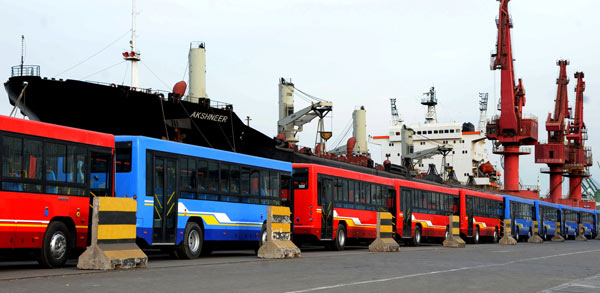 Coaches are loaded for export to Venezuela at the Lian Yungang port in Jiangsu province in this file photo taken in Dec 2013. WANGCHUN / XINHUA
|
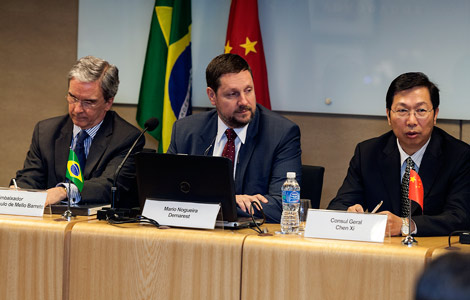
 Brazil launches China desk to handle economic ties with China
Brazil launches China desk to handle economic ties with China
 NY Wheel reels in Chinese EB-5 investors
NY Wheel reels in Chinese EB-5 investors
 The Penguins of Madagascar to enter China
The Penguins of Madagascar to enter China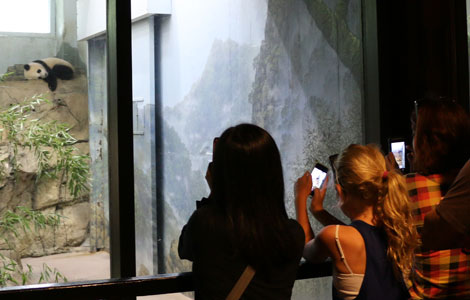
 Panda cub Bao Bao turns one
Panda cub Bao Bao turns one
 HK kid's symphony returns to NY
HK kid's symphony returns to NY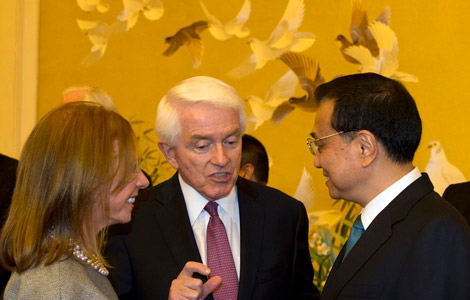
 China, US reach agreement
China, US reach agreement
 40 bodies from jet returned to Dutch soil
40 bodies from jet returned to Dutch soil
 Dance troupe's fusion performance wins over judges
Dance troupe's fusion performance wins over judges
Most Viewed
Editor's Picks

|

|

|

|

|

|
Today's Top News
Manufacturing hits an 18-month high
Transformers producers hit with breach of contract suit
US chipmaker to be deemed monopoly
Chinese still seek Beckel termination
One dead in shooting in Philadelphia
France: Air Algerie plane 'probably' crashed
TransAsia crash while landing in Taiwan
China, UC-Davis set up food safety center
US Weekly

|

|






